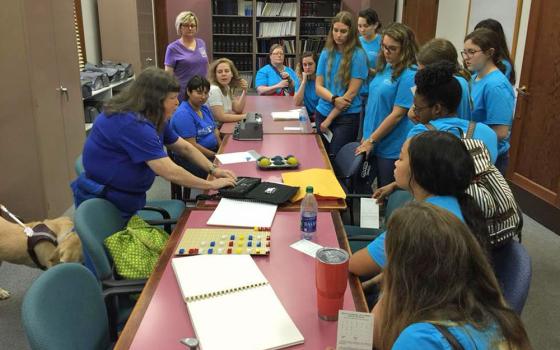Two hundred years ago this month, St. Rose Philippine Duchesne opened the first Society of the Sacred Heart school outside of Europe.
To celebrate that milestone, the international order, now in 41 countries, is hosting a Global Day of Service for sisters, associates, employees, volunteers and students to take on dozens of service projects, including cleaning beaches, making food for homeless shelters, and adapting yoga poses for those with injuries or disabilities.
Born in France in 1769, Duchesne left Europe in March 1818 to open the Academy of the Sacred Heart in St. Charles, Missouri, on Sept. 14, 1818, the first free school west of the Mississippi and the first Catholic school in what would become the St. Louis Archdiocese. Today, there are more than 150 Sacred Heart schools in 33 countries, including 22 in the United States.
"The idea behind this is that by serving the world through our service and revealing God's love, we are honoring this woman," said Sacred Heart Sr. Maureen Glavin, who helped organize the project. "It's an attempt on our part as her spiritual sons and daughters to be open-hearted and look for where we can build bridges. Where are the frontiers, the peripheries, the vulnerable, and what can we do to bring them God's love?"
This year, the Global Day of Service is Sept. 15, a Saturday, to make it easier for people to participate. Some Sacred Heart schools, however, did their projects early, including several on Sept. 11 to coordinate with the remembrance of the 2001 terrorist attacks.
The day will begin as the sun rises over the international date line with a prayer at a Sacred Heart school in New Zealand.
"We're hoping it will be a wave of grace around the world," Glavin said.
Even within the United States, the event will be international: A delegation of Sacred Heart school students from France will be in the St. Louis area to join in the service projects and celebrations. The 22 students will also visit Duchesne's shrines in St. Charles and Florissant, Missouri, and make a pilgrimage to Kansas to where she lived with the Potawatomi tribe later in her life.
Glavin said the bicentennial celebration is also one for the congregation itself, celebrating the fact that Duchesne, even on the frontier, faithfully wrote to Mother Madeleine Sophie Barat, the order's foundress, back in France, maintaining the relationship with her European congregation when many other women religious split from their orders to found new ones in the United States.
"We're honoring this woman who really helped to make our congregation international," Glavin said. "She kept that relationship when many didn't."
The congregation is also using social media to spread the word, encouraging anyone taking part to share it with the hashtags #SacredHeartService and #CoeurValues.
"The hope is to connect with each other and use social media in a positive way," Glavin said.
Though Duchesne is a historic figure for her work opening schools, she is most known in the United States for her work with Native Americans of the Potawatomi tribe. Hundreds of Potawatomi in 1838 were forced from their land in Indiana on the Trail of Death to the Sugar Creek mission in Kansas. Duchesne and three other Sacred Heart sisters joined them in 1841 to open a school for Potawatomi girls, though age and health issues forced her return to St. Charles after only a year. She died Nov. 18, 1852, at the age of 83.
Janet Pearl, a member of the Potawatomi tribe, said she grew up hearing stories from her parents about Duchesne that had been passed down through the generations. Pearl's great-great-grandmother, Equa-ke-sec, was on the Trail of Death and a student in Duchesne's school at Sugar Creek.
At the time, Duchesne could not do much but pray because of her age, frailty and inability to speak the Potawatomi language, and the tribe soon named her Woman Who Prays Always.
"The children that were with her at Sugar Creek learned faithfulness and prayer from her example," Pearl said. "A strong Catholic faith and a strong belief in prayer is in our family from the roots of the Native Americans being with Philippine. ... I learned from my father and mother that prayer is a refuge you turn to."
Glavin said while Duchesne was heroic for her efforts on the American frontier, she was also fearless while she was still in France, attempting to live out her mission even though the French Revolution had closed or suppressed all religious houses.
"Some of the things she did, like visiting priests in prison, people were being beheaded for," Glavin said. "We think of her as always praying, but she was courageous. She could have had her head chopped off."
Each Sacred Heart school, province and alumni association was encouraged to discern what projects they might do for Global Service Day.
"If Philippine Duchesne were alive today, where would her heart be?" Glavin said. "Where would she plant her feet, roll up her sleeves and get her hands dirty?"
[Dan Stockman is national correspondent for Global Sisters Report. His email address is [email protected]. Follow him on Twitter or on Facebook.]


